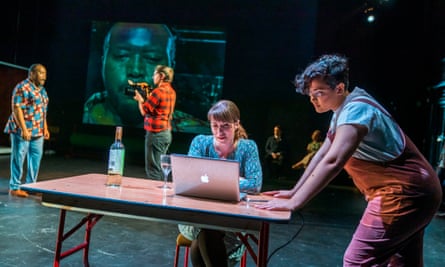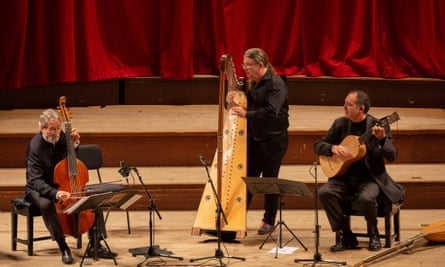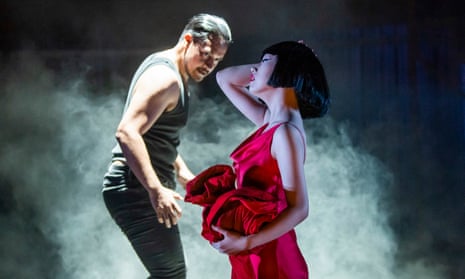In theory we might try to ignore the circumstances surrounding a work’s creation. Sometimes, as in the case of Hans Werner Henze’s Phaedra, such high-mindedness is impossible. Between writing the opera’s two acts, Henze (1926-2012), then aged 79 and in morbid humour, fell into a two-month coma. One day he woke up feeling well, completed the opera and lived into his mid-80s. In a disturbing echo, Act 2 tells how the dead Hippolytus, stepson of Phaedra and object of her desires, is restored to life, or an approximation of it.
A new staging by the Royal Opera’s Jette Parker Young Artists of this 2007 work, directed by Noa Naamat and conducted by Edmund Whitehead, reveals how wildly different Henze’s before-and-after music is. With a dense libretto by Christian Lehnert, reworking Euripides, Ovid, Racine and then some, the work moves with unyielding weight in Act 1, in a style akin to Noh theatre. The second part, instead, has a voluptuousness – expressionist jazz and waltz clashing with serialism and dissonance – we associate with this German-born composer, who spent most of his adult life in Italy. High voice ensembles bring to mind Richard Strauss.
The lean, one-to-a-part score ripples with the dark timbres of low woodwind: alto flute, cor anglais, contrabass clarinet, saxophones. In contrast, piano, celesta, harp and various tuned percussion offer sensuous glimmer and flare. The Southbank Sinfonia negotiated the challenges with stylish confidence. Henze’s reputation ebbs and flows. This made me want to hear more. I can’t say I’m altogether keen on operas in which all the women are vile harpies but it would be wrong to interpret this many-layered work too literally.
Henze called Phaedra a “concert opera”, perhaps indicating that a simplicity of presentation was all his penultimate stage work required. Takis’s designs, with lighting by Lee Curran, used a small revolve and a modest double staircase, giving the Minotaur a vantage point from which to lurk and control (which Michael Mofidian did, to grim effect). The JPYA singers shone, led by the Chinese mezzo-soprano Hogni Wu as a bird-like manga-vamp Phaedra, with countertenor Patrick Terry (Artemis) acrobatic in the role’s vocal extremes and Jacquelyn Stucker an alluring, Lycra-clad Aphrodite. New Zealand tenor Filipe Manu, in his ROH debut, was outstanding as Hippolyt: poetic, full of pathos, gyrating his ghostly way through Henze’s uneasy dance of death.
Why are we here? That is the single question which most interests Purni Morell, formerly artistic director of the young people’s Unicorn theatre, now working independently. Her stated impatience with art having to have an educational value, a measurable purpose, blasts refreshingly through the grey clag of PC arts culture. In a first collaboration with the Unicorn, ENO has joined forces with Morell for a production of Dido and Aeneas, called Dido – Purcell’s concise 1689 masterpiece has always been more about her than him – aimed especially at teenagers.
Text and music are more or less intact, performed with a small, expert ensemble of ENO players, crisply conducted by Valentina Peleggi (who gamely accepts a glass of fizz from the eponymous lovers halfway through). In this updated version, Dido is a single mother. Her servant Belinda is now her daughter who, while doing her homework, tragically observes the arrival and allure of the stranger Aeneas and, when he departs, her mother’s suicide.

The sympathetic, wide-open environment of the Unicorn, with musicians to one side, chorus and soloists in the middle, should have served well, but the action was robbed of contour, detail and focus. Whether this Dido will reach the target mid-teen audience (given its untimely clash with the start of exams) is doubtful. The details of the action were well-nigh impossible to follow, but mood and emotion spoke powerfully, particularly through the figure of Belinda, sung with bright tenderness by 18-year-old Eyra Norman, a first-year undergraduate at the Royal College of Music. The whys and wherefores of the chorus may have remained foggy – who were they, what did their wandering around mean? – but their singing was vigorous and heartfelt. Heading the cast, Rachael Lloyd and Njabulo Madlala showed how excellent voices expressing love or sorrow can touch the soul, even if the specifics have eluded you.
Purcell’s contemporaries, many unfamiliar – Gaspar Sanz, Johannes Schenck – featured in L’Europa Musicale, a typically eclectic concert by the Catalan viol master and baroque entrepreneur Jordi Savall, with his ensemble Hèsperion XXI. It was a highlight of the opening weekend of the 2019 London festival of baroque music, whose theme is travel and discovery. Savall’s discreet virtuosity, and that of his equally brilliant harp and theorbo confreres Andrew Lawrence-King and Xavier Díaz-Latorre, whispered, twirled and improvised through versions of La Folia. This popular dance of the middle ages, of Portuguese origin, went viral, you might say, throughout Europe. Every composer had a go. The silvery music of Purcell’s French contemporary Marin Marais (1656-1728) – think Tous les matins du monde – stole this mesmerising show. Listen to it on Radio 3 on 5 June and be quietly dazzled.

Star ratings (out of five)
Phaedra ★★★★
Dido ★★
Hespèrion XXI ★★★★★
Phaedra is in rep at the Linbury theatre, Royal Opera House, London, until 20 May
Dido is at the Unicorn theatre, London, until 2 June

Comments (…)
Sign in or create your Guardian account to join the discussion